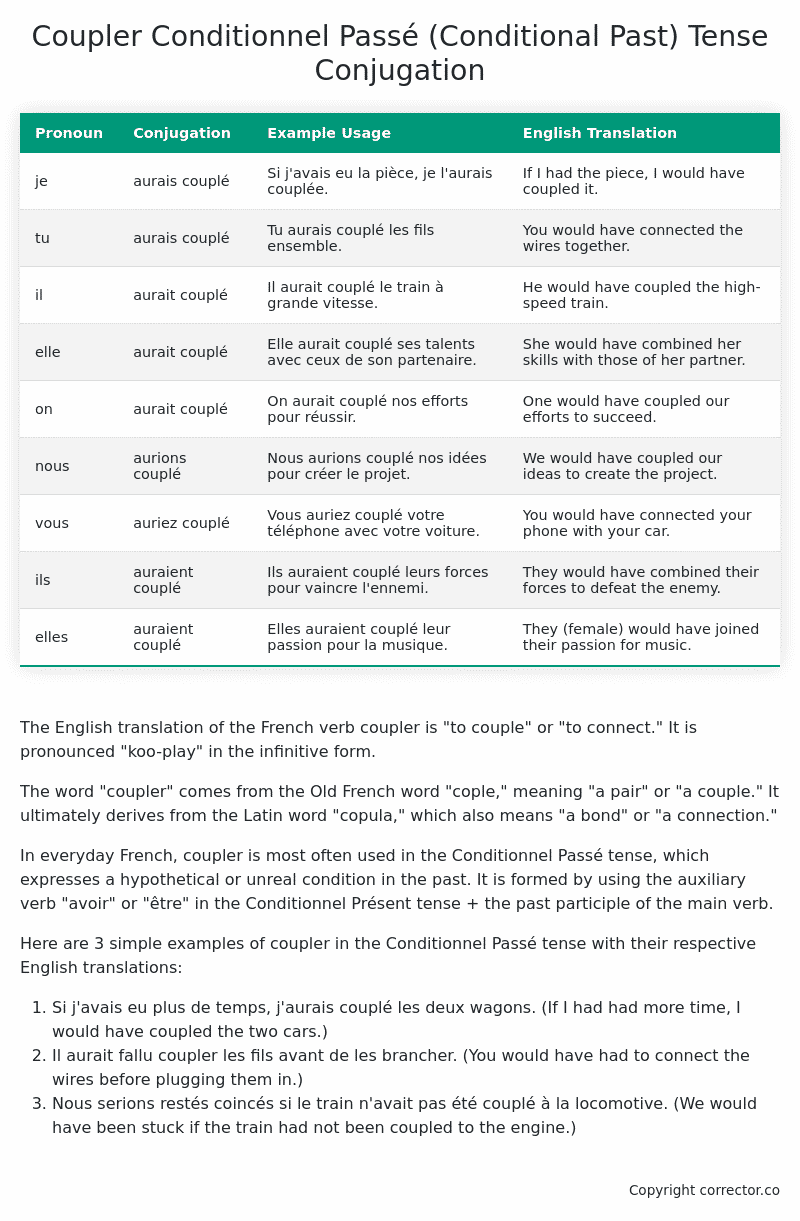Conditionnel Passé (Conditional Past) Tense Conjugation of the French Verb coupler
Introduction to the verb coupler
The English translation of the French verb coupler is “to couple” or “to connect.” It is pronounced “koo-play” in the infinitive form.
The word “coupler” comes from the Old French word “cople,” meaning “a pair” or “a couple.” It ultimately derives from the Latin word “copula,” which also means “a bond” or “a connection.”
In everyday French, coupler is most often used in the Conditionnel Passé tense, which expresses a hypothetical or unreal condition in the past. It is formed by using the auxiliary verb “avoir” or “être” in the Conditionnel Présent tense + the past participle of the main verb.
Here are 3 simple examples of coupler in the Conditionnel Passé tense with their respective English translations:
- Si j’avais eu plus de temps, j’aurais couplé les deux wagons. (If I had had more time, I would have coupled the two cars.)
- Il aurait fallu coupler les fils avant de les brancher. (You would have had to connect the wires before plugging them in.)
- Nous serions restés coincés si le train n’avait pas été couplé à la locomotive. (We would have been stuck if the train had not been coupled to the engine.)
Table of the Conditionnel Passé (Conditional Past) Tense Conjugation of coupler
| Pronoun | Conjugation | Example Usage | English Translation |
|---|---|---|---|
| je | aurais couplé | Si j’avais eu la pièce, je l’aurais couplée. | If I had the piece, I would have coupled it. |
| tu | aurais couplé | Tu aurais couplé les fils ensemble. | You would have connected the wires together. |
| il | aurait couplé | Il aurait couplé le train à grande vitesse. | He would have coupled the high-speed train. |
| elle | aurait couplé | Elle aurait couplé ses talents avec ceux de son partenaire. | She would have combined her skills with those of her partner. |
| on | aurait couplé | On aurait couplé nos efforts pour réussir. | One would have coupled our efforts to succeed. |
| nous | aurions couplé | Nous aurions couplé nos idées pour créer le projet. | We would have coupled our ideas to create the project. |
| vous | auriez couplé | Vous auriez couplé votre téléphone avec votre voiture. | You would have connected your phone with your car. |
| ils | auraient couplé | Ils auraient couplé leurs forces pour vaincre l’ennemi. | They would have combined their forces to defeat the enemy. |
| elles | auraient couplé | Elles auraient couplé leur passion pour la musique. | They (female) would have joined their passion for music. |
Other Conjugations for Coupler.
Le Present (Present Tense) Conjugation of the French Verb coupler
Imparfait (Imperfect) Tense Conjugation of the French Verb coupler
Passé Simple (Simple Past) Tense Conjugation of the French Verb coupler
Passé Composé (Present Perfect) Tense Conjugation of the French Verb coupler
Futur Simple (Simple Future) Tense Conjugation of the French Verb coupler
Futur Proche (Near Future) Tense Conjugation of the French Verb coupler
Plus-que-parfait (Pluperfect) Tense Conjugation of the French Verb coupler
Passé Antérieur (Past Anterior) Tense Conjugation of the French Verb coupler
Futur Antérieur (Future Anterior) Tense Conjugation of the French Verb coupler
Subjonctif Présent (Subjunctive Present) Tense Conjugation of the French Verb coupler
Subjonctif Passé (Subjunctive Past) Tense Conjugation of the French Verb coupler
Subjonctif Imparfait (Subjunctive Imperfect) Tense Conjugation of the French Verb coupler
Subjonctif Plus-que-parfait (Subjunctive Pluperfect) Tense Conjugation of the French Verb coupler
Conditionnel Présent (Conditional Present) Tense Conjugation of the French Verb coupler
Conditionnel Passé (Conditional Past) Tense Conjugation of the French Verb coupler (this article)
L’impératif Présent (Imperative Present) Tense Conjugation of the French Verb coupler
L’infinitif Présent (Infinitive Present) Tense Conjugation of the French Verb coupler
Struggling with French verbs or the language in general? Why not use our free French Grammar Checker – no registration required!
Get a FREE Download Study Sheet of this Conjugation 🔥
Simply right click the image below, click “save image” and get your free reference for the coupler Conditionnel Passé tense conjugation!

Coupler – About the French Conditionnel Passé (Conditional Past) Tense
Formation
Common Everyday Usage Patterns
Expressing Unreal Past Scenarios
Polite Requests or Suggestions
Expressing Doubt or Uncertainty
Interactions with Other Tenses
Conditional Present
Indicative Past Tenses
Conditional Future
Summary
Want More?
I hope you enjoyed this article on the verb coupler. Still in a learning mood? Check out another TOTALLY random French verb conjugation!


